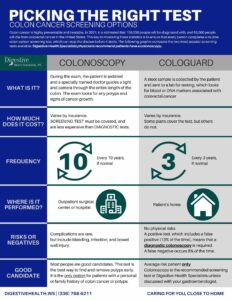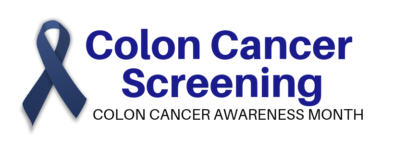Digestive Health Specialists, PA is here to help if you, or someone you know, would like more information, or if you are experiencing any digestive health symptoms and would like further evaluation. Feel free to give us a call at 336-768-6211 or fill out the form below.
Picking the Right Test – Colonoscopy or Cologuard
Colon cancer is highly preventable and treatable. It is estimated that in 2022, over 100,000 people will be diagnosed, and over 40,000 people will die from colorectal cancer in the United States. The key to improving these statistics is to ensure that every person completes a routine colon cancer screening test, which can stop the disease before it starts. But, what is the best colon cancer screening option for you? Below we compare the two most popular screening tests available, Colonoscopy and Cologuard®.
What are they?
Colonoscopy:
During the exam, the patient is sedated and a specially-trained doctor guides a light and camera through the entire length of the colon. The exam looks for any polyps and signs of cancer growth. If found, they can be removed before they become cancerous.
Cologuard®:
A stool sample is collected by the patient and sent to a lab for testing, which looks for blood or DNA markers associated with colorectal cancer.
How much does it cost?
Colonoscopy:
The cost varies by insurance. A screening test MUST be covered, and are less expensive than diagnostic tests.
Cologuard®:
The cost varies by insurance. Some plans cover the test, but others do not.
What is the frequency?
Colonoscopy:
If your exam results are normal, you would need a colonoscopy every 10 years.
Cologuard®:
If your exam results are normal, you would need a colonoscopy every 3 years.
Where is it performed?
Colonoscopy:
At an outpatient surgical center
Cologuard®:
At the patient’s home
What are the risks or negatives?
Colonoscopy:
Complications are rare but include bleeding, infection, and bowel wall injury.
Cologuard®:
It has no physical risks. A positive test, which includes a false positive (13% of the time), means that a diagnostic colonoscopy is required. A false negative occurs 8% of the time.
Who is a good candidate?
Colonoscopy:
Most people are good candidates. This test is the best way to find and remove polyps early. It is the only option for patients with a personal or family history of colon cancer or polyps.
Cologuard®:
This test is good for average-risk patients only.
At Digestive Health Specialists, a colonoscopy is the recommended screening test, unless other options are discussed with your gastroenterologist.
If you would like to download the information contained in this article in a printer-friendly version, please click on the link below:
Picking the Right Test (for download)












